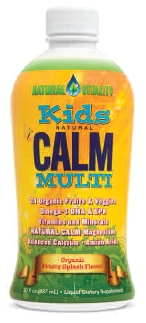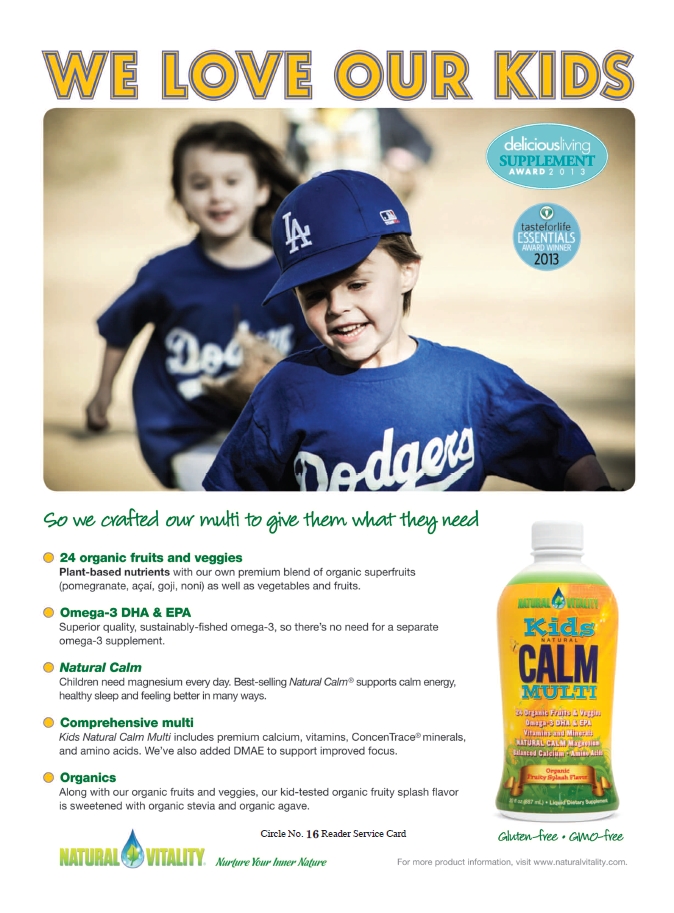I’m always asked by parents, “What supplements can I give my kids?” They know their kids are existing on peanut butter and jelly sandwiches, hot dogs, pizza and French fries in spite of their best efforts. And they know that nutrients are missing. I’ve had parents buy supplements they have to crush and hide in applesauce, liquid fish oils that their children gagged on, and capsules that had to be opened up and disguised for consumption.
Over the years, I’ve challenged supplement companies to come up with a safe product that kids will actually take. In my books, I’ve listed the following requirements for a good kids’ supplement:
• Magnesium: 200 mg per day
• Calcium in balance with magnesium: 200 mg per day
• Zinc: 2–5 mg per day
• Essential fatty acids EPA and DHA: 150–200 mg per day of each
• B vitamins in methylated form
• Vitamin C: 200 mg per day
• A multiple containing: Vitamins A, D and E, as well as trace minerals
• Non-chewable, liquid form
• Non-sucrose sweeteners
A Kid’s Supplement That Works
Currently only one company meets my criteria. Kids Natural Calm Multi from Natural Vitality provides a good-tasting liquid supplement using organic flavors and organic non-sugar sweeteners. The multi includes Natural Calm magnesium, zinc, EFAs, methylated B vitamins (B6, B12), vitamin C and a trace mineral complex. Plus, they’ve added a blend of 24 organic vegetables and fruits most kids don’t get in their current diet.
Let me go into the details of why these various ingredients and requirements are important in a formula for your child.
Magnesium. Magnesium is the mineral that relaxes muscles and nerves. It allows an exact amount of calcium to enter cells and cause a contraction. Then, magnesium removes excess calcium to prevent buildup. Without enough magnesium, calcium floods muscle and nerve cells, creating spasms and irritability. The following is from my book, The Magnesium Miracle:
It’s not just adults who get anxious because they are on magnesium-deficient diets. Most foods that kids eat are magnesium-deficient. The phosphates in soda actually bind magnesium, making it unavailable. The stress on kids sometimes seems more intense than on their parents. Peer pressure, academic and athletic performance pressures, worries about body image, the changes and hormonal fluctuations of puberty, exposure to negative events, and violence through the media also contribute to an excess requirement for magnesium. ADHD, autism, juvenile delinquency, and childhood depression are associated with magnesium deficiency, and some say these conditions can be caused by it.
Because of these factors, supplementing with magnesium has become increasingly important.
Calcium in Balance with Magnesium. I often have to tell parents to eliminate dairy  from their children’s diet. Their immediate reaction is, “What about calcium for their growing bones?” I remind them that magnesium is actually just as important for kids because there is less of it in the diet. Based on the scientific literature and my own clinical experience, I feel children should actually be given more magnesium than calcium.
from their children’s diet. Their immediate reaction is, “What about calcium for their growing bones?” I remind them that magnesium is actually just as important for kids because there is less of it in the diet. Based on the scientific literature and my own clinical experience, I feel children should actually be given more magnesium than calcium.
Zinc. At puberty, zinc could be considered an essential mineral for kids. If they have asthma or allergies, get frequent colds and flu, and their cuts and scrapes seem to take too long to heal, it’s likely they are getting too little zinc. White spots on the nails and a poor sense of taste are signs of a zinc deficiency. Poor sense of taste means that a child will crave sugar, because most other tastes seem bland. Once zinc is introduced, kids miraculously start trying other foods.
Essential Fatty Acids. Omega-3 EFAs, specifically EPA and DHA, are necessary for physical, emotional and mental health. All the cells in the body have a cell membrane that’s partly made up of EFAs. EFAs are important in the prevention and treatment of allergies and asthma and in promoting healthy brain function.
Vitamin B Complex. The B vitamins are important as cofactors for thousands of metabolic functions in the body, including the complex functioning of the brain. Methylated (partially metabolized) forms of the B vitamins are very important in autism and ADHD to overcome specific enzyme blocks. And since they are the most bioavailable form, they are good for everyone.
Vitamin A. Vitamin A is a fat-soluble vitamin found in meat, liver, eggs, milk and cheese. It’s essential for the formation of healthy teeth, bones, soft tissue, mucous membranes and skin. It enhances vision, especially in dim light.
Vitamin D. Vitamin D is another fat-soluble vitamin found in fish, eggs, fortified milk and cod liver oil. However, the fortified milk that’s sold in stores contains synthetic vitamin D2. I recommend either taking natural vitamin D3 supplements or spending 20 to 30 minutes a day in the sun.
Vitamin E. Vitamin E protects the body from damage caused by free radicals. It protects the heart, lungs and brain. Vitamin E is very low in the standard American diet, so it’s important to supplement. But make sure it’s a natural form. Natural vitamin E is listed as d-alpha tocopherol, whereas synthetic forms of vitamin E are labeled with a dl- prefix.
Trace Minerals. There are up to 80 different minerals used by the body. They include potassium, sodium, manganese, zinc, iron, copper, iodine, selenium, molybdenum and chromium. When we just focus on one mineral like calcium, we are throwing the whole body off balance.
Carolyn Dean, M.D., N.D., is a Medical Advisory Board member of the Nutritional Magnesium Association. More information about magnesium is available at www.nutritionalmagnesium.org.











